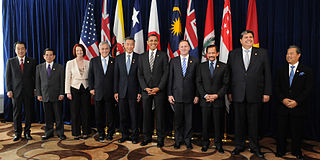
The Economy of Guatemala is a considered a developing economy, highly dependent on agriculture, particularly on traditional crops such as coffee, sugar, and bananas. Guatemala's GDP per capita is roughly one-third of Brazil's. The Guatemalan economy is the largest in Central America. It grew 3.3 percent on average from 2015 to 2018. However, Guatemala remains one of the poorest countries in Latin America and the Caribbean, having highly unequal incomes and chronically malnourished children. The country is beset by political insecurity, and lacks skilled workers and infrastructure. It depends on remittances for nearly one-tenth of the GDP.

The Office of the United States Trade Representative (USTR) is an agency of the United States federal government responsible for developing and promoting American trade policy. Part of the Executive Office of the President, it is headed by the U.S. Trade Representative, a Cabinet-level position that serves as the U.S. President's primary advisor, negotiator, and spokesperson on trade matters. USTR has more than two hundred employees, with offices in Geneva, Switzerland, and Brussels, Belgium.

The Dominican Republic– Central America Free Trade Agreement is a free trade agreement. Originally, the agreement encompassed the United States and the Central American countries of Costa Rica, El Salvador, Guatemala, Honduras, and Nicaragua, and was called CAFTA. In 2004, the Dominican Republic joined the negotiations, and the agreement was renamed CAFTA-DR.

The Australia – United States Free Trade Agreement (AUSFTA) is a preferential trade agreement between Australia and the United States modelled on the North American Free Trade Agreement (NAFTA). The AUSFTA was signed on 18 May 2004 and officially came into effect on 1 January 2005.

The Caribbean Basin Trade Partnership Act (CBTPA) is a United States legislative act signed into law on May 18, 2000 by President Bill Clinton as part of the Trade and Development Act of 2000. This latter act, which also included the Africa Growth and Opportunity Act of 2000 (AGOA), was intended to advance U.S. economic and security interests by strengthening American relationships with other regions of the world then viewed to be making significant strides in terms of economic development and political reform.
The Caribbean Basin Initiative (CBI) was a unilateral and temporary United States program initiated by the 1983 Caribbean Basin Economic Recovery Act (CBERA). The CBI came into effect on January 1, 1984, and aimed to provide several tariff and trade benefits to many Central American and Caribbean countries. Provisions in the CBERA prevented the United States from extending preferences to CBI countries that it judged to be contrary to its interests or that had expropriated American property.

Azurix Corp. is a water services company, headquartered in Houston, Texas. The company owned and operated facilities in North America, Europe, and South America. In 2007, Azurix was awarded a $165 million claim against the government of Argentina by an international arbitral tribunal; the company is currently involved in a dispute over Argentina's refusal to pay the claim.

The African Growth and Opportunity Act, or AGOA is a piece of legislation that was approved by the U.S. Congress in May 2000. The stated purpose of this legislation is to assist the economies of sub-Saharan Africa and to improve economic relations between the United States and the region. After completing its initial 15-year period of validity, the AGOA legislation was extended on 29 June 2015 by a further 10 years, to 2025.
The Caribbean-Canada Trade Agreement known as ("CARIBCAN") is a Canadian government programme, established in 1986 by the Parliament of Canada. The agreement was created to promote trade, investment and provide industrial cooperation through the preferential access of duty-free goods from the countries of the Commonwealth-Caribbean to the Canadian market.

The Trans-Pacific Partnership (TPP), or Trans-Pacific Partnership Agreement, was a proposed trade agreement between Australia, Brunei, Canada, Chile, Japan, Malaysia, Mexico, New Zealand, Peru, Singapore, Vietnam, and the United States signed on 4 February 2016. After the newly elected US president Donald Trump withdrew the US signature from TPP in January 2017, the agreement could not be ratified as required and did not enter into force. The remaining countries negotiated a new trade agreement called Comprehensive and Progressive Agreement for Trans-Pacific Partnership, which incorporates most of the provisions of the TPP and which entered into force on 30 December 2018.
The US-Morocco Free Trade Agreement is a bilateral trade agreement between the United States and Morocco. The agreement was signed on June 15, 2004, followed by U.S. President George W. Bush's signing of the USMFTA Implementation Act on August 17, 2004. The United States House of Representatives ratified the pact on July 22, 2004 by a 323–99 vote. The United States Senate passed the bill by unanimous consent on July 21, 2004. The Morocco FTA came into effect on January 1, 2006.
The United States–Peru Trade Promotion Agreement is a bilateral free trade agreement, whose objectives are eliminating obstacles to trade, consolidating access to goods and services and fostering private investment in and between the United States and Peru. Besides commercial issues, it incorporates economic, institutional, intellectual property, labor and environmental policies, among others. The agreement was signed on April 12, 2006; ratified by the Peruvian Congress on June 28, 2006; by the U.S. House of Representatives on November 2, 2007 and by the U.S. Senate on December 4, 2007. The Agreement was implemented on February 1, 2009.

The Fair Labor Association (FLA) is a non-profit collaborative effort of universities, civil society organizations, and businesses.

Haiti–United States relations are bilateral relations between Haiti and the United States.

The economy of Belize is a small, essentially private enterprise economy that is based primarily on agriculture, tourism, and services. The cultivation of newly discovered oil in the town of Spanish Lookout has presented new prospects and problems for this developing nation. Belize's primary exports are citrus, sugar, and bananas. Belize's trade deficit has been growing, mostly as a result of low export prices for sugar and bananas.

Qualifying Industrial Zones (QIZ) are industrial parks that house manufacturing operations in Jordan and Egypt. The QIZ program was introduced in 1996 by the U.S. Congress to stimulate regional economic cooperation. Goods produced in QIZ-designated areas in Egypt, Jordan and the Palestinian territories can directly access U.S. markets without tariff or quota restrictions, subject to certain conditions. To qualify, goods produced in these zones must contain a small portion of Israeli input. In addition, a minimum 35% value to the goods must be added to the finished product. The idea was first proposed by Jordanian businessman Omar Salah in 1994.

Caribbean Basin Economic Recovery Act of 1983 (CBERA) — P.L. 98-67, Title II, authorized unilateral preferential trade and tax benefits for eligible Caribbean countries, including duty-free treatment of eligible products.

The Special 301 Report is prepared annually by the Office of the United States Trade Representative (USTR) that identifies trade barriers to United States companies and products due to the intellectual property laws, such as copyright, patents and trademarks, in other countries. By April 30 of each year, the USTR must identify countries which do not provide "adequate and effective" protection of intellectual property rights or "fair and equitable market access to United States persons that rely upon intellectual property rights".
International labour law is the body of rules spanning public and private international law which concern the rights and duties of employees, employers, trade unions and governments in regulating the workplace. The International Labour Organization and the World Trade Organization have been the main international bodies involved in reforming labour markets. The International Monetary Fund and the World Bank have indirectly driven changes in labour policy by demanding structural adjustment conditions for receiving loans or grants. Issues regarding Conflict of laws arise, determined by national courts, when people work in more than one country, and supra-national bodies, particularly in the law of the European Union, has a growing body of rules regarding labour rights.
The Accord on Fire and Building Safety in Bangladesh was signed on 15 May 2013. It is a five-year independent, legally binding Global Framework Agreement between global brands, retailers and trade unions designed to build a safe and healthy Bangladeshi Ready Made Garment (RMG) Industry. The agreement was created in the immediate aftermath of the Rana Plaza building collapse that led to the death of more than 1100 people and injured more than 2000. In June 2013, an implementation plan was agreed leading to the incorporation of the Bangladesh Accord Foundation in the Netherlands in October 2013.











